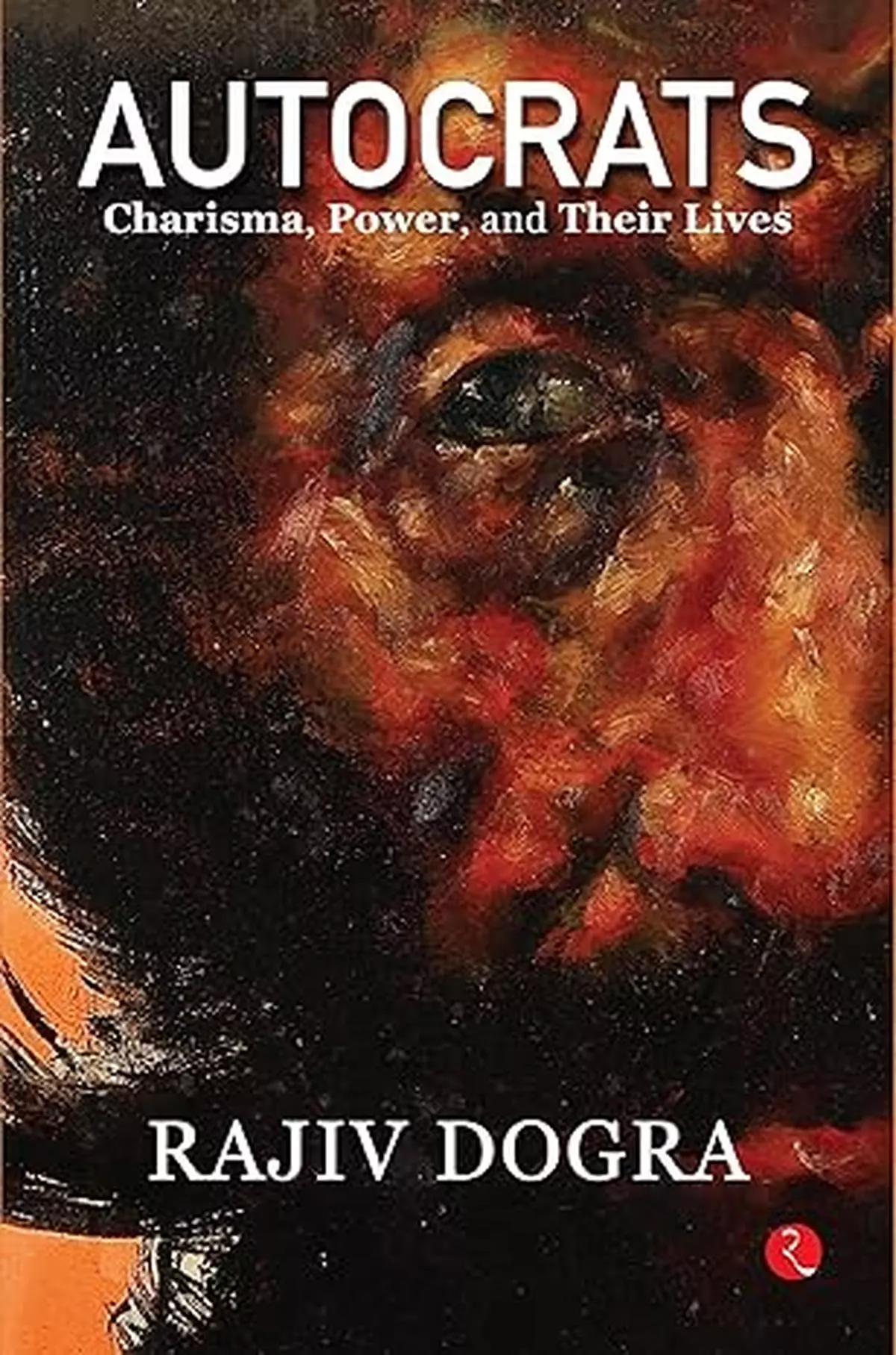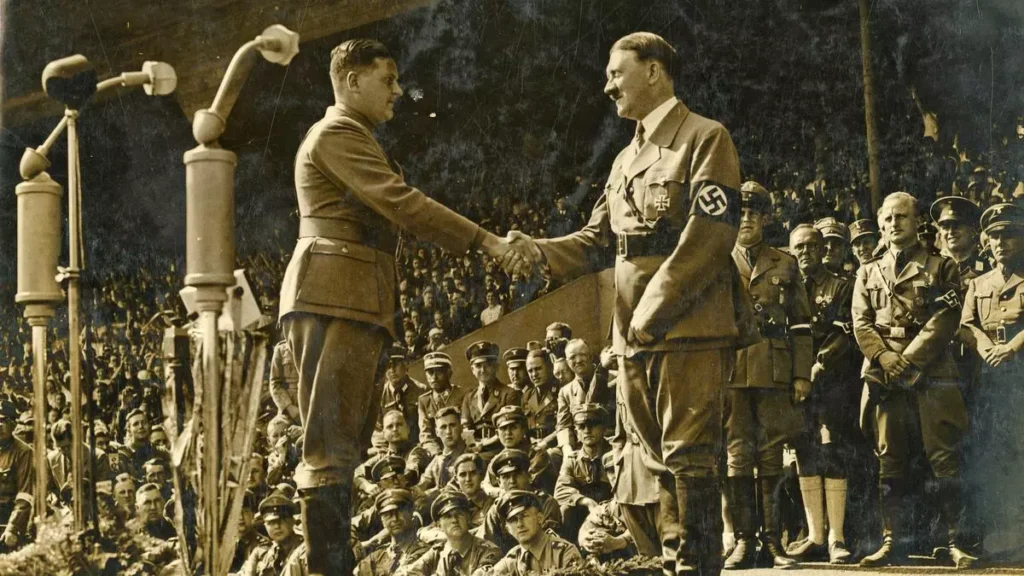
September 1934: Adolf Hitler with the leader of the Hitler Youth Association at the Nuremberg stadium. The book finds striking similarities in the behavioural patterns of most dictators. They are generally found to be narcissists who feed on the adulation and endorsement of the sycophants who surround them.
| Photo Credit: The Hindu Archives
The brutal reality of history is that dark times have been its signature tune and “autocracy” its default condition. The word autocracy has Greek origins, where “auto” means self and “krato” power. The veteran scholarly diplomat Ambassador Rajiv Dogra’s book Autocrats: Charisma, Power, and Their Lives cites real-life instances and situations to show how an authoritarian cult takes hold of society, grows, and sustains itself.
Autocrats: Charisma, Power, and Their Lives
By Rajiv Dogra
Rupa Publications
Pages: 352
Price: Rs.795
The book gives a sense of the 20th century experience as a crucial case in point during which close to 170 million people died under ruthless dictators ranging from Adolf Hitler, Joseph Stalin, Mao Zedong, and Nicolae Ceauşescu to Saddam Hussein. It gives a compelling account of the inner demons of strong men, their anxieties, and their phobias. The author reasons that perhaps their difficult childhoods might have driven them and transformed them into taking revenge in later years.
Striking similarities in behavioural patterns
The study finds striking similarities in the behavioural patterns of most dictators. They are generally found to be narcissists who feed on the adulation and endorsement of the sycophants who surround them. They create an illusion of absolute power that often confuses them into miscalculating their end even when it is staring them in the face. Emperor Asoka was an exceptional case of personality reversal. Dictators inspire enthusiasm and mesmerise people into believing in a better tomorrow but scrupulously follow the Napoleonic maxim of “promise everything and deliver nothing”. Their ostentatious lifestyles, especially of their spouses—Imelda Marcos and Elena Ceauşescu, for instance—are meant to create an aura of invincibility around them. Marcus Aurelius’ caution is profound: “Everything we hear is an opinion, not a fact. Everything we see is a perspective, not a truth.”
Also Read | Trumping Democracy
From the dawn of civilisation, democracy as a form of government is said to have lasted for about a century with intermittent blips. Plato’s belief that all democratic forms of government create a licentious and undisciplined population that ultimately succumbs to the promises of a dictator has been proved right many a time. It resonates in Benito Mussolini’s warning that “the liberal state is designed to perish”. Thus, an appeal for democracy can be a smokescreen for majoritarian tyranny, a sort of cyclical form aptly captured by Victor Hugo when he said: “When dictatorship is a fact, revolution becomes a right.”
Dogra justifies the inclusion of colonialists in the same category as autocrats by characterising them as “tyrants” for they displayed a similar contempt for the people they ruled for several centuries. Their lack of remorse or regret for the subjugated past of the liberated colonies is deplorable as Barack Obama rightly observed when he wrote in one of his books: “The worst thing that colonialism did was to cloud our view of the past.” Preserving that memory, the author argues, serves as an important collective objective of instilling in our progeny the lesson that history must not be allowed to repeat itself.

The book alludes to how policies of capitalism in the West that promote amassing wealth, evading taxes, and shifting profits to safe havens are creating fault lines that eventually allow authoritarianism to slip in across nations. The casual linkages can be better understood in the context of widening income disparities, rising poverty, and growing indebtedness in the Global South. The rise of right-wing nationalism in the West and enduring dictatorial regimes in poor countries can be attributed to these mercantilist trends.
Also Read | Akeel Bilgrami on identity, inner life and stereotyping
Further, the book covers the dangers of the misuse of technology, focussing on how social media and AI are increasingly contributing to shaping people’s views in a way that allows them to be manipulated by autocrats to create dissent and destabilise societies for the perpetuation of autocratic rule. In situations where an entire people is emotionally charged, the appeal to reason remains ineffective. This is particularly true in crisis situations such as the COVID-19 pandemic, an economic recession, social strife, and war, which often endure with no easy respite. The use of surveillance technologies by those in power, should they choose to abuse them, risks blurring the distinction between an autocrat and a democratic leader.
Dogra concludes that as democracy is the essence of human existence, it will prevail. This sentiment hinges on the belief that a democracy is less damaging than an autocracy despite the former’s weaknesses. To prevent state capture by the powerful, he suggests that there is a need to build guard-rails through constitutionalism, the rule of law, competitiveness, anti-monopoly laws, collective bargaining, and the equitable distribution of wealth and resources. Ultimately, the responsibility to save democracy rests with people, who possess the ability to make prudent choices when selecting leaders, a sentiment well articulated by Charlie Chaplin in his 1940 film, The Great Dictator: “People have the power to make this life free and beautiful… dictators free themselves but they enslave the people.” Mahatma Gandhi made a pertinent point: “It is not good for us to worship an individual. Only an ideal or a principle can be worshipped.”
Dammu Ravi is a serving Foreign Service officer.
Source:https://frontline.thehindu.com/books/review-autocracy-and-authoritarian-cult-and-society-20th-century-technology/article69095382.ece

